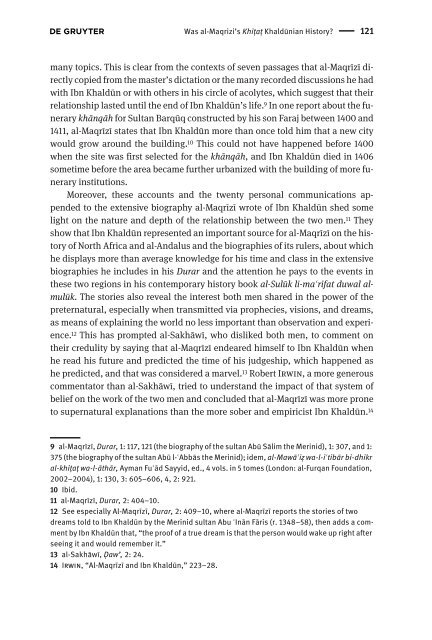0021-1818_islam_98-1-2-i-259
0021-1818_islam_98-1-2-i-259
0021-1818_islam_98-1-2-i-259
You also want an ePaper? Increase the reach of your titles
YUMPU automatically turns print PDFs into web optimized ePapers that Google loves.
Was al-Maqrizi’s Khitat Khaldunian History? 121<br />
many topics. This is clear from the contexts of seven passages that al-Maqr\z\ directly<br />
copied from the master’s dictation or the many recorded discussions he had<br />
with Ibn Khaldun or with others in his circle of acolytes, which suggest that their<br />
relationship lasted until the end of Ibn Khaldun’s life. 9 In one report about the funerary<br />
khanqah for Sultan Barquq constructed by his son Faraj between 1400 and<br />
1411, al-Maqr\z\ states that Ibn Khaldun more than once told him that a new city<br />
would grow around the building. 10 This could not have happened before 1400<br />
when the site was first selected for the khanqah, and Ibn Khaldun died in 1406<br />
sometime before the area became further urbanized with the building of more funerary<br />
institutions.<br />
Moreover, these accounts and the twenty personal communications appended<br />
to the extensive biography al-Maqr\z\ wrote of Ibn Khaldun shed some<br />
light on the nature and depth of the relationship between the two men. 11 They<br />
show that Ibn Khaldun represented an important source for al-Maqr\z\ on the history<br />
of North Africa and al-Andalus and the biographies of its rulers, about which<br />
he displays more than average knowledge for his time and class in the extensive<br />
biographies he includes in his Durar and the attention he pays to the events in<br />
these two regions in his contemporary history book al-Suluk li-ma^rifat duwal almuluk.<br />
The stories also reveal the interest both men shared in the power of the<br />
preternatural, especially when transmitted via prophecies, visions, and dreams,<br />
as means of explaining the world no less important than observation and experience.<br />
12 This has prompted al-Sakhaw\, who disliked both men, to comment on<br />
their credulity by saying that al-Maqr\z\ endeared himself to Ibn Khaldun when<br />
he read his future and predicted the time of his judgeship, which happened as<br />
he predicted, and that was considered a marvel. 13 Robert Irwin, a more generous<br />
commentator than al-Sakhaw\, tried to understand the impact of that system of<br />
belief on the work of the two men and concluded that al-Maqr\z\ was more prone<br />
to supernatural explanations than the more sober and empiricist Ibn Khaldun. 14<br />
9 al-Maqr\z\, Durar, 1: 117, 121 (the biography of the sultan Abu Salim the Merinid), 1: 307, and 1:<br />
375 (the biography of the sultan Abu l-^Abbas the Merinid); idem, al-Mawa^iz wa-l-i^tibar bi-dhikr<br />
al-khitat wa-l-athar, Ayman Fu#ad Sayyid, ed., 4 vols. in 5 tomes (London: al-Furqan Foundation,<br />
2002–2004), 1: 130, 3: 605–606, 4, 2: 921.<br />
10 Ibid.<br />
11 al-Maqr\z\, Durar, 2: 404–10.<br />
12 See especially Al-Maqr\z\, Durar, 2: 409–10, where al-Maqr\z\ reports the stories of two<br />
dreams told to Ibn Khaldun by the Merinid sultan Abu ^Inan Faris (r. 1348–58), then adds a comment<br />
by Ibn Khaldun that, “the proof of a true dream is that the person would wake up right after<br />
seeing it and would remember it.”<br />
13 al-Sakhaw\, Daw’, 2: 24.<br />
14 Irwin, “Al-Maqr\z\ and Ibn Khaldun,” 223–28.


